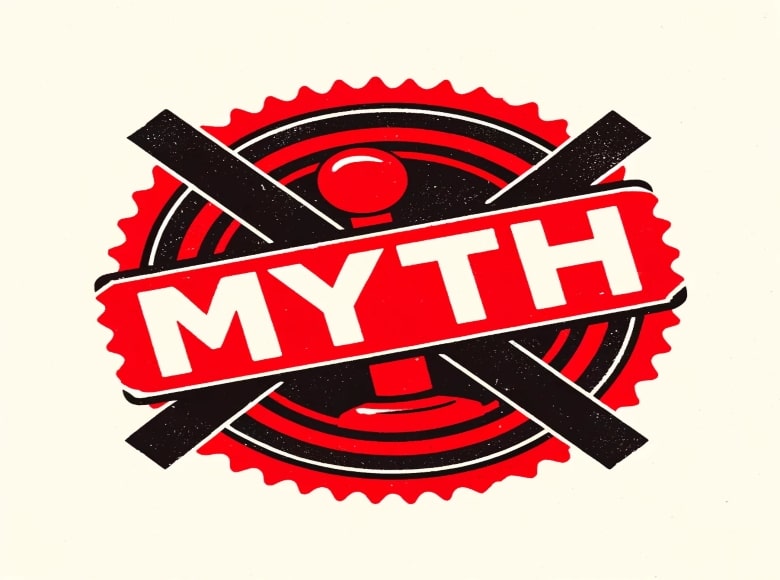
Investing can often feel like navigating a maze, especially when you’re planning for retirement. With the plethora of information available, it’s easy to fall prey to myths about market trends that can influence your decisions and potentially derail your retirement plans. In this article, I address some common market trend myths to help you make more informed investment decisions.
Myth 1: “The Stock Market Always Goes Up”
One of the most pervasive myths is the belief that the stock market always rises in the long run. While it’s true that historically, markets have shown an upward trajectory over decades, this doesn’t mean they’re immune to prolonged periods of volatility or even decline. For instance, the FTSE 100 has seen significant ups and downs over the past 30 years, including the dot-com bubble burst in 2000 and the financial crisis in 2008. Japan’s stock market, the Nikkei, didn’t grow between 1989 and 2024; 35 years of stagnation!
Reality Check: Markets are cyclical, and while they may recover and grow over time, it’s crucial to be prepared for downturns. Diversifying your investments across different asset classes and countries can help mitigate risks associated with market fluctuations and periods of stagnation.
Myth 2: “Stock Markets Are Too Risky”
Contrary to Myth 1, many people shy away from investing in the stock market due to its perceived riskiness. They fear losing their hard-earned money and prefer to keep their savings in cash or low-risk bonds. However, while stocks can be volatile in the short term, they tend to offer higher returns over the long term than other asset classes. If you want your money to support you in retirement exposure to the stock markets is likely to be necessary.
Reality Check: All investments carry some level of risk, including cash, which can lose value over time due to inflation. By diversifying your portfolio and including a mix of stocks, bonds, and other assets, you can balance potential risks and rewards. Investing in well-established companies and funds with a track record of stability and growth can also help mitigate risks.
Myth 3: “Property Investing Is Better Than Pensions”
Many people believe that property investment is a more secure and lucrative option than pensions. While property can be a valuable part of an investment portfolio, it has risks and challenges: property investors have been targetted by successive Chancellors, the recent interest rate rises have increased borrowing costs, there are regular maintenance costs to factor in, and potential void periods when tenants can’t be found. And, there is the hassle factor that more people are finding is not worth it.
Reality Check: Pensions offer significant tax advantages and often come with employer contributions that can substantially boost your retirement savings. Additionally, pensions provide a diversified investment approach that can be tailored to your risk tolerance and retirement goals. Balancing property investments with a solid pension plan can offer a more stable and comprehensive financial future.
Myth 4: “You Can Time the Market”
Many investors believe they can predict market movements and buy low, sell high. This idea of timing the market is alluring but fraught with risk. Even seasoned investors and financial analysts struggle to accurately predict market trends consistently.
Reality Check: Instead of trying to time the market, focus on time in the market. A disciplined, long-term investment strategy often yields better results than trying to catch every peak and trough. Regularly investing a fixed amount, known as pound-cost averaging, can help smooth out the effects of market volatility.
Myth 5: “Past Performance Indicates Future Returns”
It’s common to look at a fund or stock’s past performance as a predictor of future success. However, past performance is not a reliable indicator of future outcomes. Markets are influenced by a myriad of factors, including economic conditions, geopolitical events, and changes in investor sentiment.
Reality Check: When evaluating investments, consider a range of factors beyond historical returns. Look at the underlying assets, the management team, fees, and how the investment fits within your overall portfolio and risk tolerance. Rather than trying to find the “best” fund, investing in the broad index is typically more effective.
Myth 6: “Bonds Are Always Safe”
Bonds are often viewed as a safer investment compared to stocks, especially for those nearing or in retirement. While it’s true that bonds tend to be less volatile, they are not without risk. Interest rate changes, inflation, and credit risk can all impact bond prices and returns. Just ask any cautious investor or pension fund manager burnt by the fallout of Kwazi Kwarteng’s mini-Budget.
Reality Check: Diversify within your bond holdings by investing in a mix of government, corporate, and international bonds. Consider the duration and credit quality of the bonds to manage risk effectively.
Myth 7: “You Need a Lot of Money to Invest”
Many people believe that investing is only for the wealthy. This myth can discourage those with modest savings from entering the market. However, you don’t need a large sum to start investing. Many platforms and funds allow for small, regular investments.
Reality Check: Start with what you can afford and build from there. Take advantage of tax-efficient accounts like ISAs (Individual Savings Accounts) and employer-sponsored pension schemes, which can offer growth opportunities even for smaller investments. A strategy of little and often trumps a lot, but never every time.
Myth 8: “It’s Too Late to Start Investing”
If you’re in your 50s or 60s and haven’t yet started investing, it can feel like you’ve missed the boat. However, it’s never too late to begin. While starting earlier has its advantages, you can still build a robust portfolio later in life.
Reality Check: Focus on strategies suited to your time horizon and risk tolerance. If you have built up savings you may be able to make use of pension rules that allow you to contribute larger sums. If the children have left home you may also have more disposable income to allocate towards your retirement planning.
Myth 9: “Financial News Provides All You Need to Know”
Staying informed is essential, but relying solely on financial news can lead to a reactive investment approach. Headlines are often designed to grab attention and may not provide the nuanced information necessary for making sound investment decisions.
Reality Check: When reading, listening to or watching financial news consider the intentions of the content producer. The mainstream media have a lot of influence but themselves are influenced by those with different motivations; usually the financial institutions who provide the advertising revenue.
Myth 10: “Bad News Always Causes Markets to Fall”
There is a common belief that any negative news will inevitably lead to a market downturn. While bad news can impact investor sentiment and cause short-term volatility, markets do not always react predictably to negative events.
Reality Check: Markets are complex and influenced by a multitude of factors. Sometimes, they may already have priced in the bad news, or other positive factors might offset the negative impact. It’s essential to maintain a long-term perspective and avoid making hasty decisions based on short-term news.
Making Informed Decisions
Navigating the world of investments requires a clear understanding of market dynamics and an awareness of commonly held myths. By debunking these misconceptions, you can approach your retirement planning with greater confidence and realism. Remember, the key to successful investing lies in patience, discipline and good habits repeated regularly.
Preparing for retirement involves more than just understanding market trends. It’s about creating a balanced portfolio that aligns with your financial goals and provides the security you need for the future.
If you want to know how you can plan for your retirement get in touch for an initial conversation.






